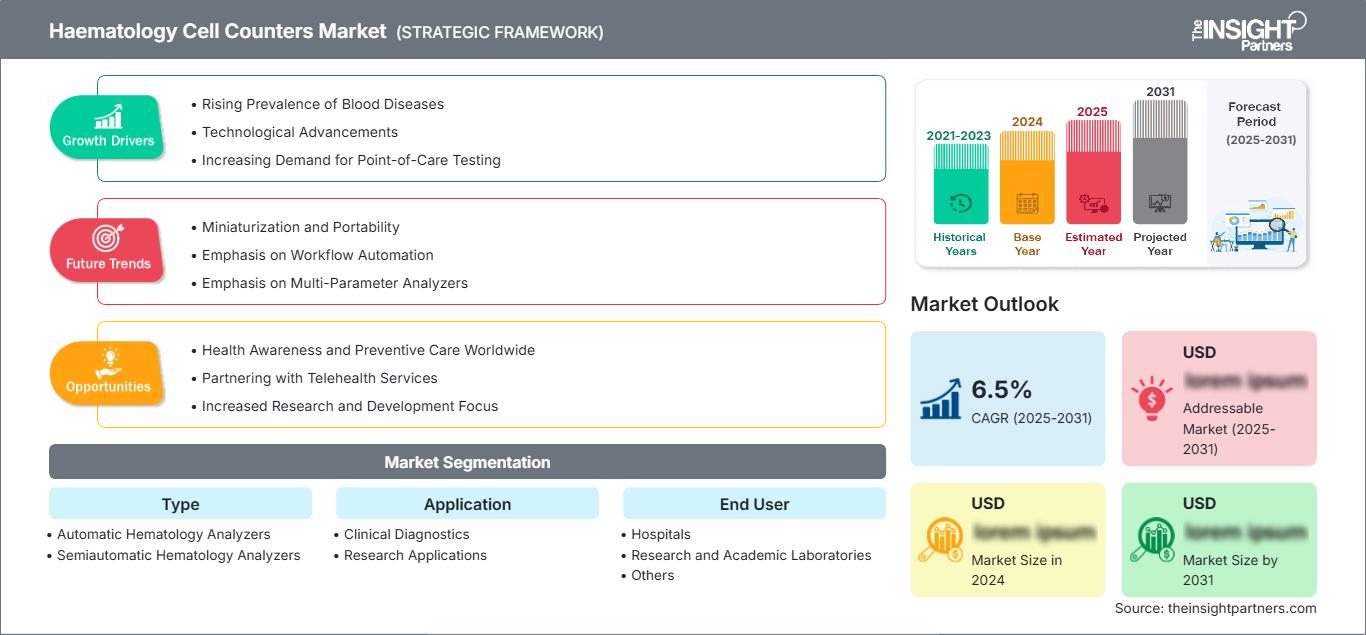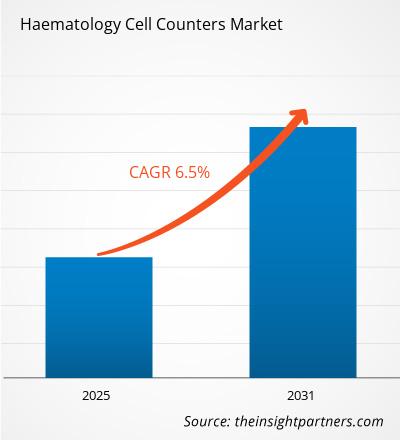Haematology Cell Counters Market Size, Share, Growth and Trends by Forecast by 2031
Haematology Cell Counters Market Size and Forecasts (2021 - 2031), Global and Regional Share, Trends, and Growth Opportunity Analysis Report Coverage: by Type (Automatic Hematology Analyzers, Semiautomatic Hematology Analyzers); Application (Clinical Diagnostics, Research Applications); End User (Hospitals, Research and Academic Laboratories, Others), and Geography (North America, Europe, Asia Pacific, and South and Central America)
Historic Data: 2021-2023 | Base Year: 2024 | Forecast Period: 2025-2031- Report Date : Mar 2026
- Report Code : TIPRE00012930
- Category : Life Sciences
- Status : Upcoming
- Available Report Formats :


- No. of Pages : 150
The Haematology Cell Counters Market is expected to register a CAGR of 6.5% from 2025 to 2031, with a market size expanding from US$ XX million in 2024 to US$ XX Million by 2031.
The report is segmented by Type (Automatic Hematology Analyzers, Semiautomatic Hematology Analyzers). The report further presents analysis based on Application (Clinical Diagnostics, Research Applications). The report is further segmented based on End User (Hospitals, Research and Academic Laboratories, Others). The global analysis is further broken-down at regional level and major countries. The report offers the value in USD for the above analysis and segments.
Purpose of the Report
The report Haematology Cell Counters Market by The Insight Partners aims to describe the present landscape and future growth, top driving factors, challenges, and opportunities. This will provide insights to various business stakeholders, such as:
- Technology Providers/Manufacturers: To understand the evolving market dynamics and know the potential growth opportunities, enabling them to make informed strategic decisions.
- Investors: To conduct a comprehensive trend analysis regarding the market growth rate, market financial projections, and opportunities that exist across the value chain.
- Regulatory bodies: To regulate policies and police activities in the market with the aim of minimizing abuse, preserving investor trust and confidence, and upholding the integrity and stability of the market.
Haematology Cell Counters Market Segmentation
Type
- Automatic Hematology Analyzers
- Semiautomatic Hematology Analyzers
Application
- Clinical Diagnostics
- Research Applications
End User
- Hospitals
- Research and Academic Laboratories
- Others
Geography
- North America
- Europe
- Asia-Pacific
- South and Central America
- Middle East and Africa
Customize This Report To Suit Your Requirement
Get FREE CUSTOMIZATIONHaematology Cell Counters Market: Strategic Insights

-
Get Top Key Market Trends of this report.This FREE sample will include data analysis, ranging from market trends to estimates and forecasts.
Haematology Cell Counters Market Growth Drivers
- Rising Prevalence of Blood Diseases: The high prevalence of blood diseases such as anemia, leukemia, and other hematological diseases is the main driving force for this hematology cell counters market. Healthcare providers heavily rely on current and latest cell counters with increasing numbers of patients who require proper diagnosis that necessitates efficient treatment and management, therefore driving the market.
- Technological Advancements: Advancements in the technology of hematology cell counters form a key driving force in the market. For instance, improvements in automated counting, increased accuracy, as well as ease of user interface lead to enhanced blood analysis efficiency. These products not only make the laboratory work easier but are also contributing to better patient results; hence health institutions are installing more of them.
- Increasing Demand for Point-of-Care Testing: The expanding application base of point-of-care testing (POCT) fuels the demand for cell counters for hematology. Consumer preference for quick diagnosis capabilities in healthcare delivery will see providers turning towards portable and user-friendly cell counters for immediate attention through timely intervention and better patient management in geographies.
Haematology Cell Counters Market Future Trends
- Miniaturization and Portability: Hematology cell counters are miniaturized and portable. Compact, user-friendly devices allow for point-of-care settings or direct testing in remote areas on the spot. This shift increases access to diagnostics, improves speed to decision, and ultimately, patient care.
- Emphasis on Workflow Automation: This is changing the hematology cell counters market because of the greater importance of automation in the workflow of the laboratory. Automated systems cut down human errors and provide better throughput that allows a lab to process samples more efficiently. In this trend of automated systems, laboratories are leaning toward extensive usage of advanced analyzers for hematology that easily accept automation.
- Emphasis on Multi-Parameter Analyzers: With demand for multi-parameter hematology analyzers coming out from the need for comprehensive blood analysis in one test, it represents a great step forward toward workflow automation. Such sophisticated instruments help improve workflows because they give more than one result, such as cell counts and morphology assessment, all at once. This progresses to more efficient laboratory operations and better diagnostics among healthcare providers.
Haematology Cell Counters Market Opportunities
- Health Awareness and Preventive Care Worldwide: Rising health awareness and greater emphasis on preventive care are driving the market for hematology cell counters. Individuals have been adopting various measures to improve their health, and resultant routine blood tests have been on the rise. With respect to this trend, it has become challenging for the healthcare facility to stay up in the game by keeping up with the advance hematology equipment.
- Partnering with Telehealth Services: Major innovation for hematology cell counter makers and telehealth service providers would result from collaboration on remote diagnostics. The use of hematology analyzers would be the way healthcare practitioners could conduct remote consultations while monitoring patient health status by integrating these analyzers with telehealth platforms. This synergy could increase access to diagnostic services, especially in underprivileged rural areas, leading to better care of patients.
- Increased Research and Development Focus: With an increase in the emphasis on developing products in hematology, there is scope for innovation in cell counters. As better biotechnology and automation cut through, more complex devices can be manufactured to yield better accuracy and functionality. The trend makes easy investments in R&D, contributing to differentiation in the market.
Haematology Cell Counters Market Regional Insights
The regional trends and factors influencing the Haematology Cell Counters Market throughout the forecast period have been thoroughly explained by the analysts at The Insight Partners. This section also discusses Haematology Cell Counters Market segments and geography across North America, Europe, Asia Pacific, Middle East and Africa, and South and Central America.
Haematology Cell Counters Market Report Scope
| Report Attribute | Details |
|---|---|
| Market size in 2024 | US$ XX million |
| Market Size by 2031 | US$ XX Million |
| Global CAGR (2025 - 2031) | 6.5% |
| Historical Data | 2021-2023 |
| Forecast period | 2025-2031 |
| Segments Covered |
By Type
|
| Regions and Countries Covered |
North America
|
| Market leaders and key company profiles |
|
Haematology Cell Counters Market Players Density: Understanding Its Impact on Business Dynamics
The Haematology Cell Counters Market is growing rapidly, driven by increasing end-user demand due to factors such as evolving consumer preferences, technological advancements, and greater awareness of the product's benefits. As demand rises, businesses are expanding their offerings, innovating to meet consumer needs, and capitalizing on emerging trends, which further fuels market growth.

- Get the Haematology Cell Counters Market top key players overview
Key Selling Points
- Comprehensive Coverage: The report comprehensively covers the analysis of products, services, types, and end users of the Haematology Cell Counters Market, providing a holistic landscape.
- Expert Analysis: The report is compiled based on the in-depth understanding of industry experts and analysts.
- Up-to-date Information: The report assures business relevance due to its coverage of recent information and data trends.
- Customization Options: This report can be customized to cater to specific client requirements and suit the business strategies aptly.
The research report on the Haematology Cell Counters Market can, therefore, help spearhead the trail of decoding and understanding the industry scenario and growth prospects. Although there can be a few valid concerns, the overall benefits of this report tend to outweigh the disadvantages.
Frequently Asked Questions
1. Rising Prevalence of Blood Diseases.
2. Increasing Demand for Point-of-Care Testing.
Mrinal is a seasoned research analyst with over 8 years of experience in Life Sciences Market Intelligence and Consulting. With a strategic mindset and unwavering commitment to excellence, she has built deep expertise in pharmaceutical forecasting, market opportunity assessment, and developing industry benchmarks. Her work is anchored in delivering actionable insights that empower clients to make informed strategic decisions.
Mrinal’s core strength lies in translating complex quantitative datasets into meaningful business intelligence. Her analytical acumen is instrumental in shaping go-to-market (GTM) strategies and uncovering growth opportunities across the pharmaceutical and medical device sectors. As a trusted consultant, she consistently focuses on streamlining workflow processes and establishing best practices, thereby driving innovation and operational efficiency for her clients.
- Historical Analysis (2 Years), Base Year, Forecast (7 Years) with CAGR
- PEST and SWOT Analysis
- Market Size Value / Volume - Global, Regional, Country
- Industry and Competitive Landscape
- Excel Dataset
Related Reports
Testimonials
The Insight Partners' SCADA System Market report is comprehensive, with valuable insights on current trends and future forecasts. The team was highly professional, responsive, and supportive throughout. We are very satisfied and highly recommend their services.
RAN KEDEM Partner, Reali Technologies LTDsI requested a report on a very specific software market and the team produced the report in a few days. The information was very relevant and well presented. I then requested some changes and additions to the report. The team was again very responsive and I got the final report in less than a week.
JEAN-HERVE JENN Chairman, Future AnalyticaWe worked with The Insight Partners for an important market study and forecast. They gave us clear insights into opportunities and risks, which helped shape our plans. Their research was easy to use and based on solid data. It helped us make smart, confident decisions. We highly recommend them.
PIYUSH NAGPAL Sr. Vice President, High Beam GlobalThe Insight Partners delivered insightful, well-structured market research with strong domain expertise. Their team was professional and responsive throughout. The user-friendly website made accessing industry reports seamless. We highly recommend them for reliable, high-quality research services
YUKIHIKO ADACHI CEO, Deep Blue, LLC.This is the first time I have purchased a market report from The Insight Partners.While I was unsure at first, I visited their web site and felt more comfortable to take the risk and purchase a market report.I am completely satisfied with the quality of the report and customer service. I had several questions and comments with the initial report, but after a couple of dialogs over email with their analyst I believe I have a report that I can use as input to our strategic planning process.Thank you so much for taking the extra time and making this a positive experience.I will definitely recommend your service to others and you will be my first call when we need further market data.
JOHN SUZUKI President and Chief Executive Officer, Board Director, BK TechnologiesI wish to appreciate your support and the professionalism you displayed in the course of attending to my request for information regarding to infectious disease IVD market in Nigeria. I appreciate your patience, your guidance, and the fact that you were willing to offer a discount, which eventually made it possible for us to close a deal. I look forward to engaging The Insight Partners in the future, all thanks to the impression you have created in me as a result of this first encounter.
DR CHIJIOKE ONYIA MANAGING DIRECTOR, PineCrest Healthcare Ltd.Reason to Buy
- Informed Decision-Making
- Understanding Market Dynamics
- Competitive Analysis
- Identifying Emerging Markets
- Customer Insights
- Market Forecasts
- Risk Mitigation
- Boosting Operational Efficiency
- Strategic Planning
- Investment Justification
- Tracking Industry Innovations
- Aligning with Regulatory Trends




















 Get Free Sample For
Get Free Sample For